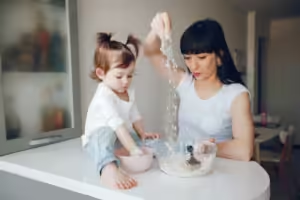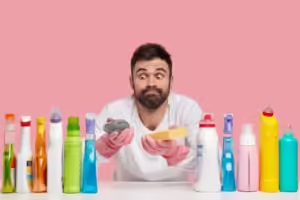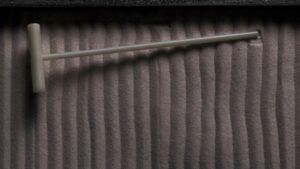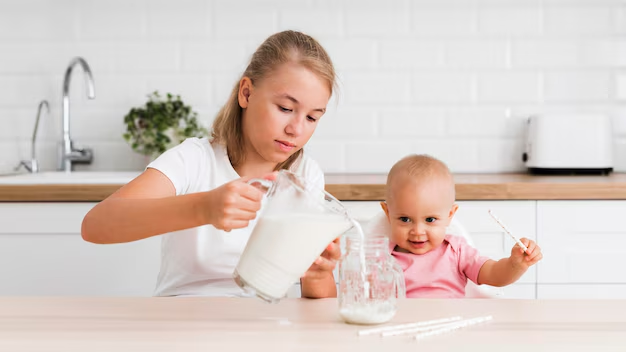How to clean baby bottles naturally?
How to Naturally Sanitize Baby Bottles: A Full Guide
Sanitizing baby bottles is essential for your baby’s health. Using organic cleaning solutions eliminates any risk of using harmful chemicals that may be associated with harsh chemical-based cleaners. Let’s explore some of the best ways to naturally sanitize baby bottles for your little one.
Why Organic Methods for Cleaning Baby Bottles?

Here are some of the advantages when choosing natural cleaning solutions: they have no toxic chemicals, are eco-friendly, and are gentle to your baby’s delicate system. Avoiding using chemical cleaners will avoid risk and opt for a greener way.How to clean baby bottles naturally
How to Clean Baby Bottles: Step-by-Step Guide
1. Gather Basic Cleaning Supplies
These are the tools you would need to begin with:How to clean baby bottles naturally
Warm water
Baking soda (Sodium bicarbonate)
Distilled white vinegar
A soft, flexible bottle brush
A clean basin or bowl
A drying rack or sanitized cloth
Optional add-ins:
Lemon extract for organic deodorizing
Coarse salt for scrubbing difficult residue spots
2. Rinse Within Minutes of Feeding

Flush bottles immediately after use with warm water to remove milk or formula residue. This way, this residue is not allowed to harden, making the cleaning process much simpler.How to clean baby bottles naturally
3. Take Bottles Apart
Disassemble all bottle parts:
Teats
Rubber rings
Caps
Anti-colic vents (if included)
Cleaning each part separately removes hidden dirt and bacteria.How to clean baby bottles naturally
4. Mix a DIY Cleaning Solution

Make a homemade cleaning solution that effectively breaks down milk scum while sterilizing the bottles:
Option A: Baking Soda Solution
Add 2 tbsp of baking soda into a basin with warm water. Soak bottle parts for about 30 minutes. Baking soda is great at cutting through grease and funk.How to clean baby bottles naturally
Option B: Vinegar Solution
Mix 1 part white vinegar with 3 parts warm water. Soak bottles and parts for 30 minutes. Vinegar is an antibacterial agent and helps dissolve mineral deposits.How to clean baby bottles naturally
Adding lemon juice can increase the strength of the cleaning solution while giving a pleasant, fragrant smell.
5. Scrub Hard
Use a soft brush to scrub each bottle part with a heavy focus on:
Inner corners and the inside of the bottle bottles.How to clean baby bottles naturally
Threads on the neck
Small vents, nipples, and caps
For tougher grime, pour baking soda directly onto the brush. Avoid abrasive materials that may damage the bottles.
6. Wash Away Cleaning Agent

Pass warm water around every part of the bottle to free the cleaning residue. Ensure there is no remaining vinegar or baking soda since it may adulterate the taste of the next feeding.How to clean baby bottles naturally
7. Sterilize for Extra Safety
Although natural cleaning is great, sterilizing offers extra assurance:
Boiling Method
Soak parts of bottles in boiling water for 5-10 minutes. Let it cool down by itself.
Steam Sterilization
Steam sterilization uses a sterilizer; it sterilizes bottles without the involvement of chemicals.How to clean baby bottles naturally
8. Air Dry on a Sanitary Surface

All the parts of bottles after cleaning should be placed on a sanitized drying rack or fresh, lint-free towel and not on dishcloths because they may introduce some bacteria. Allow the parts to air-dry completely; avoid mold or mildew.How to clean baby bottles naturally
Tips on Cleaning Bottles Naturally
Eliminate Odors with Lemon
If odors persist, wash bottles with a solution of lemon juice and hot water. Air dry for a fresh clean scent.
Use Environmentally Friendly Bottle Materials
Use glass bottles. They won’t absorb stains or odors as readily as plastic bottles.
Avoid Frequent Use in the Dishwasher
Dishwashers may not clean bottles thoroughly and can leave residue. If using one, opt for a baby-safe detergent and place bottles on the top rack.
Dedicated Cleaning Tools
Maintain a separate brush and other tools exclusively for bottle cleaning to avoid contamination.
Avoid These Common Mistakes
Delaying Cleaning
Dried milk becomes harder to clean and promotes bacterial growth. Always rinse promptly after feeding.
Using Harsh Chemicals
Detergents such as bleach can leave behind residues that are dangerous to babies. Using natural alternatives is best.
Neglecting Air Drying
Moisture behind can invite bacteria or mold. Dry to the full.
Ignoring Small Parts
Nipples, caps, and vents provide bacteria with nests when not cleaned regularly.
Benefits of Naturally Cleaning Baby Bottles
Healthier for Your Baby
Organic cleaning methods prevent the exposure of babies to toxins from chemical cleaners.
Eco-Friendly Option
Using straightforward ingredients such as baking soda and vinegar lowers plastic waste and pollution.
Budget-Friendly
These natural options are also nontoxic, yet cost-effective.
Preserves Bottle Quality
Natural cleaning does not leave the bottle scratched or warped, which can happen from the abrasive chemicals or tools used to clean.
Frequently Asked Questions on Cleaning Baby Bottles Naturally
Q1: How many times should I clean baby bottles?
Clean the bottles immediately after every use to prevent bacterial accumulation.
Q2: Is vinegar safe for baby bottles?
Yes, white vinegar is a natural disinfectant and safe when rinsed well.
Q3: Can I sterilize bottles without a sterilizer?
Yes, an equally good way of natural sterilization is by boiling in water.
Q4: Do these work against bacteria?
Indeed! Baking soda, vinegar, and hot water have been proven to kill and naturally remove bacteria and residue in bottles.
Q5: How can I best clean bottles while traveling?
Carry a small spray bottle of diluted vinegar solution and rinse bottles with warm water after cleaning.
Q6: How do I know when to replace baby bottles?
Plastic bottles need to be changed every 3-6 months. Glass ones can last much longer if properly maintained.
Final Words on the Organic Cleaning Baby Bottles
Cleaning the baby bottles naturally is easy, inexpensive, and safe for your child. With common ingredients such as baking soda, vinegar, and lemon juice, spotless bottles are yours without the hazards caused by chemicals. Adopt some of these natural methods as part of your daily routine to create a cleaner, greener environment for your child.
